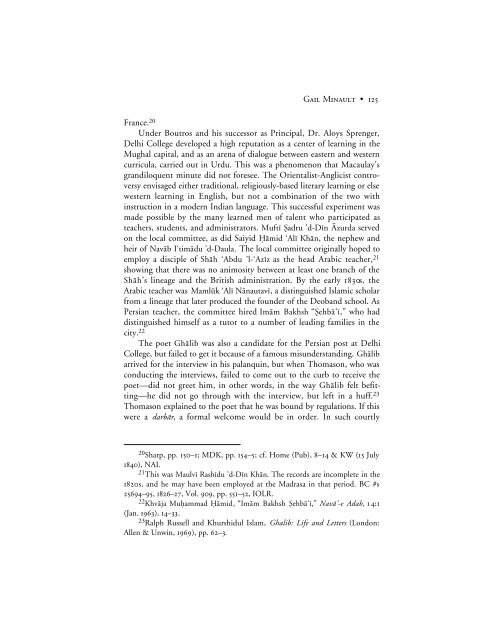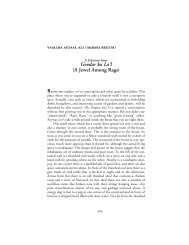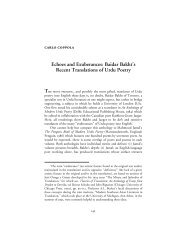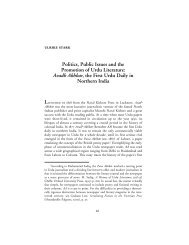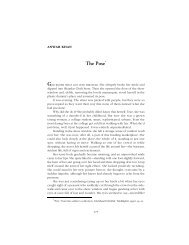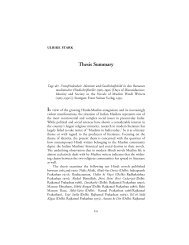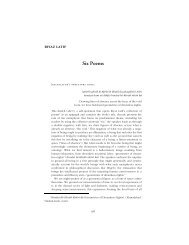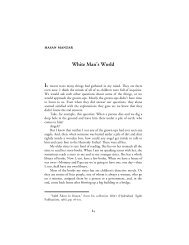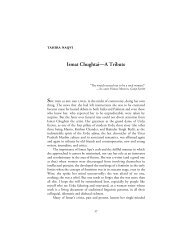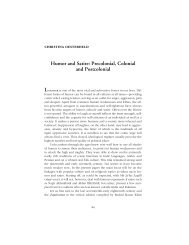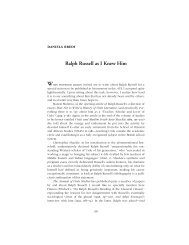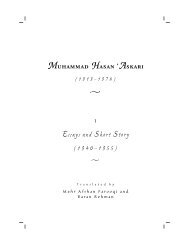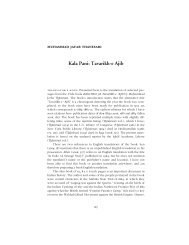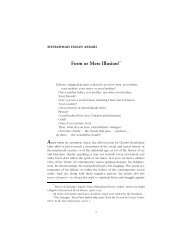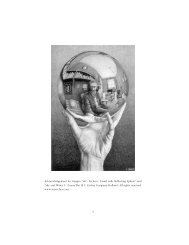Delhi College and Urdu* - MINDS@UW Home
Delhi College and Urdu* - MINDS@UW Home
Delhi College and Urdu* - MINDS@UW Home
Create successful ePaper yourself
Turn your PDF publications into a flip-book with our unique Google optimized e-Paper software.
GAIL MINAULT • 125France. 20Under Boutros <strong>and</strong> his successor as Principal, Dr. Aloys Sprenger,<strong>Delhi</strong> <strong>College</strong> developed a high reputation as a center of learning in theMughal capital, <strong>and</strong> as an arena of dialogue between eastern <strong>and</strong> westerncurricula, carried out in Urdu. This was a phenomenon that Macaulay’sgr<strong>and</strong>iloquent minute did not foresee. The Orientalist-Anglicist controversyenvisaged either traditional, religiously-based literary learning or elsewestern learning in English, but not a combination of the two withinstruction in a modern Indian language. This successful experiment wasmade possible by the many learned men of talent who participated asteachers, students, <strong>and</strong> administrators. Muftµ ¿adru ’d-Dµn ¥zurda servedon the local committee, as did Saiyid ƒ≥mid ‘Alµ Kh≥n, the nephew <strong>and</strong>heir of Nav≥b I‘tim≥du ’d-Daula. The local committee originally hoped toemploy a disciple of Sh≥h ‘Abdu ’l-‘Azµz as the head Arabic teacher, 21showing that there was no animosity between at least one branch of theSh≥h’s lineage <strong>and</strong> the British administration. By the early 1830s, theArabic teacher was Maml∑k ‘Alµ N≥nautavµ, a distinguished Islamic scholarfrom a lineage that later produced the founder of the Deob<strong>and</strong> school. AsPersian teacher, the committee hired Im≥m Bakhsh “¿ehb≥'µ,” who haddistinguished himself as a tutor to a number of leading families in thecity. 22The poet Gh≥lib was also a c<strong>and</strong>idate for the Persian post at <strong>Delhi</strong><strong>College</strong>, but failed to get it because of a famous misunderst<strong>and</strong>ing. Gh≥libarrived for the interview in his palanquin, but when Thomason, who wasconducting the interviews, failed to come out to the curb to receive thepoet—did not greet him, in other words, in the way Gh≥lib felt befitting—hedid not go through with the interview, but left in a huff. 23Thomason explained to the poet that he was bound by regulations. If thiswere a darb≥r, a formal welcome would be in order. In such courtly20 Sharp, pp. 150–1; MDK, pp. 154–5; cf. <strong>Home</strong> (Pub), 8–14 & KW (15 July1840), NAI.21 This was Maulvµ Rashµdu ’d-Dµn Kh≥n. The records are incomplete in the1820s, <strong>and</strong> he may have been employed at the Madrasa in that period. BC #s25694–95, 1826–27, Vol. 909, pp. 551–52, IOLR.22 Khv≥ja Mu√ammad ƒ≥mid, “Im≥m Bakhsh ¿ehb≥’µ,” Nav≥’-e Adab, 14:1(Jan. 1963), 14–33.23 Ralph Russell <strong>and</strong> Khurshidul Islam, Ghalib: Life <strong>and</strong> Letters (London:Allen & Unwin, 1969), pp. 62–3.


